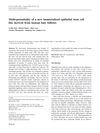Sebaceous Gland Loss and Inflammation in Scarring Alopecia: A Potential Role in Pathogenesis
January 2011

TLDR Loss of oil glands and inflammation might contribute to the development of scarring hair loss.
The study conducted 13 years ago, titled "Sebaceous gland loss and inflammation in scarring alopecia: A potential role in pathogenesis", reviewed 90 specimens with a clinical history of alopecia, both scarring and non-scarring. The results showed that sebaceous gland loss was much more common in cases of scarring alopecia (SA), with over 53% of follicles on average, compared to non-SA which had less than 5% of follicles on average. Many cases of SA showed affected follicles with an absence of sebaceous glands. The study concluded that sebaceous gland loss is a common and early finding among SA and that inflammation of the sebaceous gland and/or duct may play a role in initiating or accelerating follicular damage during the development of SA.







